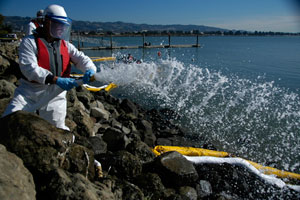Progressive groups and fisherman are attacking the Obama administration for not protecting cleanup workers in the Gulf from hazardous oil and chemical dispersant fumes. Last week, a coalition of local and national groups launched BPMakesMeSick.com, a petition calling on President Obama to ensure that BP provides workers in the Gulf with respirators.
The petition, sponsored by the Progressive Change Campaign Committee (PCCC), states:
We cannot let the denial of protective gear that hurt so many 9/11 clean-up workers happen again with the Gulf clean-up workers.
President Obama and the federal government must demand that BP allow every clean-up worker who wants to wear respiratory protective equipment to do so—and ensure that workers get the equipment and training they need to do their jobs safely.
Despite the fact that oil contains a number of harmful chemicals that workers should not inhale, the federal government does not presently require that BP provide respirators for all cleanup workers. At the end of June, the National Institute for Occupational Safety and Health (NIOSH) and the Occupational Safety and Health Administration (OSHA) issued new guidance recommending that respirators be provided for workers closest to the spill site—those who are on vessels performing controlled burns of the oil or trying to contain the leak itself. But regulators still don’t require BP to provide respirators for cleanup crews working further away from the busted well. That’s what BPMakesMeSick is trying to change.
June data from air monitoring in the Gulf region also suggests that there are likely health risks for cleanup workers farther from the spill site, too. But Gina Solomon, a senior scientist at the Natural Resources Defense Council, says BP hasn’t provided enough details about air quality problems. Without more information about “where or when the elevated levels [of toxins] were measured,” she says, “there’s not enough information in these reports to know if the new limited respiratory protection guidelines will protect these workers.”
Perhaps more disturbing, BP’s latest round of data showed that 20 percent of offshore workers have been exposed to 2-butoxyethanol, a chemical used in the dispersant Corexit 9527 that has been linked to health concerns. Short-term exposure can cause nausea and vomiting, but repeated exposure can cause damage to red blood cells and kidney and liver problems. The chemical made cleanup workers in Alaska sick after the Exxon Valdez spill in 1989. What we know about worker exposure is troubling, but as others have pointed out, the monitoring BP and OSHA are conducting may not be sufficient to monitor the full range of air quality concerns in the Gulf.
Pressure is mounting for the Obama administration to take a clearer stance on respirators and ensure that BP provides every worker in the region with protection from hazardous chemicals. The BP Makes Me Sick coalition has gathered 57,000 signatures since launching late last week, including the support of Robert F. Kennedy Jr., the Louisiana Shrimpers Association, United Commercial Fisherman, Louisiana Environmental Action Network, The Daily Kingfish, Progressive Change Campaign Committee, Democracy for America, Color Of Change, Friends of the Earth, and Commercial Fishermen of America. Four Senate candidates, 27 House candidates, and 10 current members of the House have also signed on.












